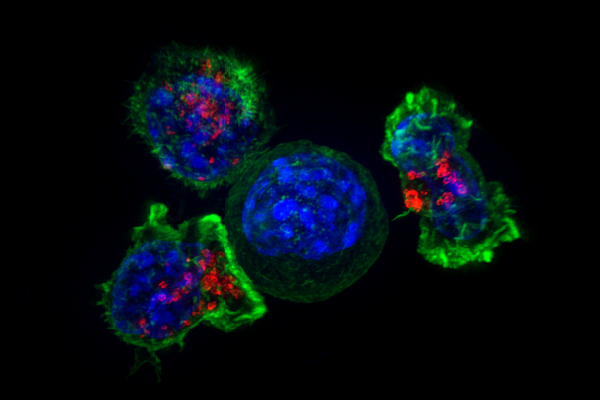New way to break cancer's vicious cycle

University of Toronto researchers have uncovered why some cancers grow faster than others. The team led by Liliana Attisano, Professor in U of T's Donnelly Centre for Cellular and Biomolecular Research, has identified a protein called NUAK2, which is produced by cancer cells to boost their proliferation and whose presence in tumours is associated with poor disease prognosis. Writing in the journal Nature Communications, the researchers show that blocking NUAK2 slows down cancer cell growth raising hopes that a drug could be developed to treat patients.
"We looked at bladder cancer and found that a subset of patients have high levels of NUAK2 protein in their tumours which also happened to be high-grade tumours," says Attisano, who is also a professor in U of T's Department of Biochemistry.
Mandeep Gill, a graduate student in Attisano's lab, first found NUAK2 while looking for a way to block the known cancer-promoting proteins called YAP and TAZ (YAP/TAZ). Highly active in many cancers, YAP/TAZ work by latching onto the DNA to switch on genes that promote cell proliferation. NUAK2 turned out to be one of the genes that was switched on by YAP/TAZ; and unexpectedly it was found to encode a protein that helps shuttle even more YAP/TAZ into the cell's nucleus, where the DNA is stored, to further bolster abnormal cell growth.
Because YAP/TAZ are active in many cancers, including the aggressive forms of breast and bladder cancer, the researchers wondered if NUAK2 too was elevated in tumour biopsies taken from patients with bladder cancer. They found that NUAK2 was present at high levels in some of the tumours and that those came from patients whose cancer progressed to a more aggressive type.
Fortunately, the flip side is that when NUAK2 is blocked, YAP/TAZ can no longer enter the nucleus. This keeps YAP/TAZ away from the DNA and breaks the vicious cycle by which cancer reinforces itself.
YAP/TAZ belong to the so-called Hippo pathway, a network of proteins that are important for normal cell and tissue growth but which often goes haywire in cancer. The pathway was named after its role in controlling organ size so that organs grow abnormally large, or "hippo-like", when the pathway breaks down.
Although the Hippo pathway, which normally keeps cell proliferation in check, is inactivated in many cancers, so far there was no good way to target it with drugs. The discovery of NUAK2 changes this.
By blocking NUAK2 protein, either by drugs or by muting the gene that encodes it, the researchers were able to slow down expansion of breast cancer cells in the dish and to shrink breast tumours in mice, respectively. A similar approach could target high-grade tumours in patients.
"If you check the patient's tumour and if they have high levels of NUAK2 protein, we could maybe treat them with NUAK2 inhibitors."
In collaboration with Rima Al-awar, Director of Drug Discovery Program at the Ontario Institute for Cancer Research, Frank Sicheri and Jeff Wrana at the Lunenfeld Tanenbaum Research Institute of Mount Sinai Hospital, Toronto, Attisano is working to develop the anti-NUAK2 compound into a form in which it can be used on animals to further validate the target.
"The ultimate goal is to find a drug that would work on people" Attisano said.
More information: Mandeep K. Gill et al, A feed forward loop enforces YAP/TAZ signaling during tumorigenesis, Nature Communications (2018). DOI: 10.1038/s41467-018-05939-2



















